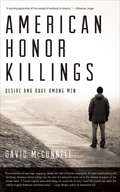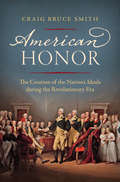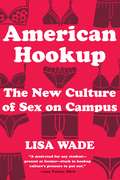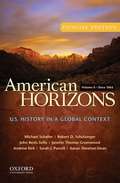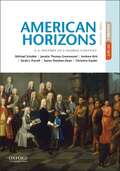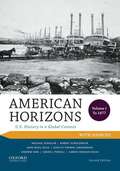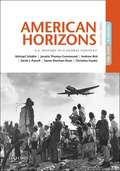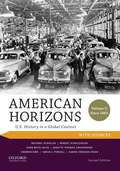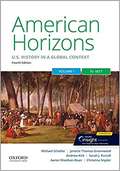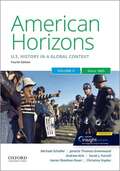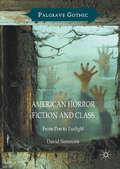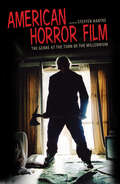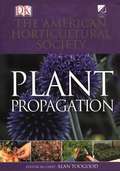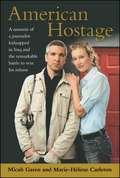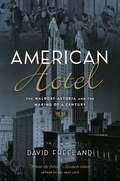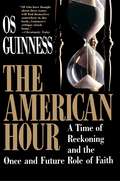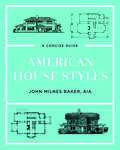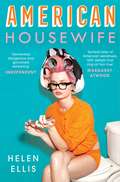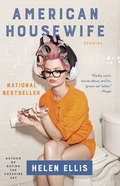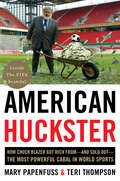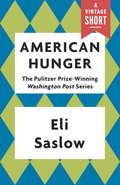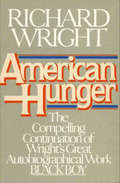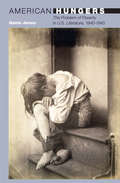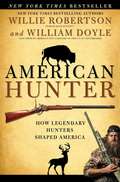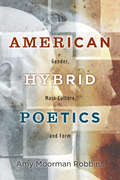- Table View
- List View
American Honor Killings: Desire and Rage Among Men
by David McconnellIN AMERICAN HONOR KILLINGS, straight and gay guys cross paths, and the result is murder. But what really happened? What role did hatred play? What about bullying and abuse? What were the men involved really like, and what was going on between them when the murder occurred? This book explores the truth behind squeamish reporting and uninformed political rants of the far right or fringe left. David McConnell, a New York-based novelist, researched cases from small-town Alabama to San Quentin's death row. The book recounts some of the most notorious crimes of our era.<P> BEGINNING IN 1999 and lasting until last year's conviction of a youth in Queens, New York, the book shows how some murderers think they're cleaning up society. Surprisingly, other killings feel almost preordained, not a matter of the victim's personality or actions so much as a twisted display of a young man's will to compete or dominate. We want to think these stories involve simple sexual conflict, either the killer's internal struggle over his own identity or a fatally miscalculated proposition. They're almost never that simple.<P> TOGETHER, THE CASES FORM A SECRET AMERICAN HISTORY of rage and desire. McConnell cuts through cant and political special pleading to turn these cases into enduring literature. In each story, victims, murderers, friends, and relatives come breathtakingly alive. The result is more soulful, more sensitive, more artful than the sort of "true crime" writing the book was modeled on. A wealth of new detail has been woven into old cases, while new cases are plumbed for the first time. The resulting stories play out exactly as they happened, an inexorable sequence of events--grisly, touching, disturbing, sometimes even with moments of levity.
American Honor: The Creation of the Nation's Ideals during the Revolutionary Era
by Craig Bruce SmithThe American Revolution was not only a revolution for liberty and freedom, it was also a revolution of ethics, reshaping what colonial Americans understood as "honor" and "virtue." As Craig Bruce Smith demonstrates, these concepts were crucial aspects of Revolutionary Americans' ideological break from Europe and shared by all ranks of society. Focusing his study primarily on prominent Americans who came of age before and during the Revolution—notably John Adams, Benjamin Franklin, Thomas Jefferson, and George Washington—Smith shows how a colonial ethical transformation caused and became inseparable from the American Revolution, creating an ethical ideology that still remains.By also interweaving individuals and groups that have historically been excluded from the discussion of honor—such as female thinkers, women patriots, slaves, and free African Americans—Smith makes a broad and significant argument about how the Revolutionary era witnessed a fundamental shift in ethical ideas. This thoughtful work sheds new light on a forgotten cause of the Revolution and on the ideological foundation of the United States.
American Hookup: The New Culture of Sex on Campus
by Lisa WadeA revelatory account of the new culture of sex that has come to dominate the American college experience. The hookup is now part of college life. Yet the drunken encounter we always hear about tells only a fraction of the story. Rising above misinformation and moralizing, Lisa Wade offers the definitive account of this new sexual culture and demonstrates that the truth is both more heartening and more harrowing than we thought. Offering invaluable insights for parents, educators, and students, Wade situates hookup culture within the history of sexuality, the evolution of higher education, and the unfinished feminist revolution. Using new research, she maps out a punishing emotional landscape marked by unequal pleasures, competition for status, and sexual violence. She discovers that the most privileged students tend to like hookup culture the most, and she considers its effects on racial and sexual minorities, students who “opt out,” and those who participate ambivalently. Accessible and open-minded, compassionate and brutally honest, American Hookup explains where we are and how we got here, asking not “How do we go back?” but “Where do we go from here?”
American Horizons, Concise: U. S. History in a Global Context, Volume II: Since 1865
by Michael Schaller Janette Thomas Greenwood Aaron Sheehan-Dean Robert Schulzinger Andrew Kirk Sarah J. Purcell John BezIs-Selfa<p>American Horizons is the only U.S. History survey text that presents the traditional narrative in a global context. The seven-author team uses the frequent movement of people, goods, and ideas into, out of, and within America's borders as a framework. This unique approach provides a fully integrated global perspective that seamlessly contextualizes American events within the wider world. The authors, all acclaimed scholars in their specialties, use their individual strengths to provide students with a balanced and inclusive account of U.S. history. <p>Presented in two volumes for maximum flexibility, American Horizons illustrates the relevance of U.S. history to American students by centering on the matrix of issues that dominate their lives. These touchstone themes include population movements and growth, the evolving definition of citizenship, cultural change and continuity, people's relationship to and impact upon the environment, political and ideological contests and their consequences, and Americans' five centuries of engagement with regional, national, and global institutions, forces, and events. In addition, this beautifully designed, full-color book features hundreds of photos and images and more than one hundred maps.</p>
American Horizons: U. S. History In A Global Context, Volume I
by Michael Schaller Janette Thomas Greenwood Christina Snyder Aaron Sheehan-Dean Andrew Kirk Sarah J. PurcellAmerican Horizons, Third Edition, presents the traditional narrative of U.S. history in a global context. The authors use the frequent movement of people, goods, and ideas into, out of, and within America's borders as a framework. This unique approach provides a fully integrated global perspective that seamlessly contextualizes American events within the wider world. The authors, all acclaimed scholars in their specialties, use their individual strengths to provide students with a balanced and inclusive account of U.S. history. Presented in two volumes for maximum flexibility, American Horizons, Third Edition, illustrates the relevance of U.S. history to American students by centering on the matrix of issues that dominate their lives. These touchstone themes include population movements and growth, the evolving definition of citizenship, cultural change and continuity, people's relationship to and impact upon the environment, political and ideological contests and their consequences, and Americans' five centuries of engagement with regional, national, and global institutions, forces, and events. In addition, this beautifully designed, full-color book features hundreds of photos and images and more than 100 maps.
American Horizons: U. S. History in a Global Context (Volume 1 #1877)
by Michael Schaller Janette Thomas Greenwood Aaron Sheehan-Dean Robert Schulzinger Andrew Kirk Sarah J. Purcell John Bezis-SelfaAmerican Horizons, Second Edition, is the only U. S. History survey text that presents the traditional narrative in a global context. The authors use the frequent movement of people, goods, and ideas into, out of, and within America's borders as a framework. This unique approach provides afully integrated global perspective that seamlessly contextualizes American events within the wider world. The authors, all acclaimed scholars in their specialties, use their individual strengths to provide students with a balanced and inclusive account of U. S. history. Presented in two volumes for maximum flexibility, American Horizons, Second Edition, illustrates the relevance of U. S. history to American students by centering on the matrix of issues that dominate their lives. These touchstone themes include population movements and growth, the evolving definitionof citizenship, cultural change and continuity, people's relationship to and impact upon the environment, political and ideological contests and their consequences, and Americans' five centuries of engagement with regional, national, and global institutions, forces, and events. In addition, thisbeautifully designed, full-color book features hundreds of photos and images and more than 100 maps.
American Horizons: U.S. History In A Global Context, Volume II: Since 1865
by Michael Schaller Janette Thomas Greenwood Christina Snyder Aaron Sheehan-Dean Robert Schulzinger Andrew Kirk Sarah J. Purcell John Bezis-SelfaAmerican Horizons, Third Edition, presents the traditional narrative of U.S. history in a global context. The authors use the frequent movement of people, goods, and ideas into, out of, and within America's borders as a framework. This unique approach provides a fully integrated global perspective that seamlessly contextualizes American events within the wider world. The authors, all acclaimed scholars in their specialties, use their individual strengths to provide students with a balanced and inclusive account of U.S. history. Presented in two volumes for maximum flexibility, American Horizons, Third Edition, illustrates the relevance of U.S. history to American students by centering on the matrix of issues that dominate their lives. These touchstone themes include population movements and growth, the evolving definition of citizenship, cultural change and continuity, people's relationship to and impact upon the environment, political and ideological contests and their consequences, and Americans' five centuries of engagement with regional, national, and global institutions, forces, and events. In addition, this beautifully designed, full-color book features hundreds of photos and images and more than 100 maps.
American Horizons: U.S. History in a Global Context (Volume II) (Second Edition)
by Michael Schaller Janette Thomas Greenwood Aaron Sheehan-Dean Robert Schulzinger Andrew Kirk Sarah J. Purcell John Bezis-SelfaAmerican Horizons, Second Edition, is the only U. S. History survey text that presents the traditional narrative in a global context. The authors use the frequent movement of people, goods, and ideas into, out of, and within America's borders as a framework. This unique approach provides afully integrated global perspective that seamlessly contextualizes American events within the wider world. The authors, all acclaimed scholars in their specialties, use their individual strengths to provide students with a balanced and inclusive account of U. S. history. Presented in two volumes for maximum flexibility, American Horizons, Second Edition, illustrates the relevance of U. S. history to American students by centering on the matrix of issues that dominate their lives. These touchstone themes include population movements and growth, the evolving definitionof citizenship, cultural change and continuity, people's relationship to and impact upon the environment, political and ideological contests and their consequences, and Americans' five centuries of engagement with regional, national, and global institutions, forces, and events. In addition, thisbeautifully designed, full-color book features hundreds of photos and images and more than 100 maps.
American Horizons: US History In A Global Context, Volume One: To 1877
by Michael Schaller Janette Thomas Greenwood Christina Snyder Aaron Sheehan-Dean Andrew Kirk Sarah J. PurcellIn American Horizons: U.S. History in a Global Context, Fourth Edition, the authors use the frequent movement of people, goods, and ideas into, out of, and within America's borders as a framework. This unique approach provides a fully integrated global perspective that seamlessly contextualizes American events within the wider world. Presented in two volumes for maximum flexibility--and supplemented by two sourcebooks of primary documents--American Horizons illustrates the relevance of U.S. history to students by centering on the matrix of issues that dominate their lives.
American Horizons: Us History In A Global Context, Volume Two: Since 1865
by Michael Schaller Janette Thomas Greenwood Christina Snyder Aaron Sheehan-Dean Andrew Kirk Sarah J. PurcellIn American Horizons: U.S. History in a Global Context, Fourth Edition, the authors use the frequent movement of people, goods, and ideas into, out of, and within America's borders as a framework. This unique approach provides a fully integrated global perspective that seamlessly contextualizes American events within the wider world. Presented in two volumes for maximum flexibility--and supplemented by two sourcebooks of primary documents--American Horizons illustrates the relevance of U.S. history to students by centering on the matrix of issues that dominate their lives.
American Horror Fiction and Class: From Poe to Twilight (Palgrave Gothic)
by David SimmonsIn this book, Simmons argues that class, as much as race and gender, played a significant role in the development of Gothic and Horror fiction in a national context. From the classic texts of Edgar Allen Poe and Nathaniel Hawthorne right through to contemporary examples, such as the novels of Stephen King and Stephenie Meyer's Twilight Series, class remains an ever present though understudied element. This study will appeal to scholars of American Studies, English literature, Media and Cultural Studies interested in class representations in the horror genre from the nineteenth century to the present day.
American Horror Film: The Genre at the Turn of the Millennium
by Steffen HantkeCreatively spent and politically irrelevant, the American horror film is a mere ghost of its former self—or so goes the old saw from fans and scholars alike. Taking on this undeserved reputation, the contributors to this collection provide a comprehensive look at a decade of cinematic production, covering a wide variety of material from the last ten years with a clear critical eye. Individual essays profile the work of up-and-coming director Alexandre Aja and reassess William Malone’s much-maligned Feardotcom in the light of the torture debate at the end of President George W. Bush’s administration. Other essays look at the economic, social, and formal aspects of the genre; the globalization of the US film industry; the alleged escalation of cinematic violence; and the massive commercial popularity of the remake. Some essays examine specific subgenres—from the teenage horror flick to the serial killer film and the spiritual horror film—as well as the continuing relevance of classic directors such as George A. Romero, David Cronenberg, John Landis, and Stuart Gordon. Essays deliberate on the marketing of nostalgia and its concomitant aesthetic and on the curiously schizophrenic perspective of fans who happen to be scholars as well. Taken together, the contributors to this collection make a compelling case that American horror cinema is as vital, creative, and thought-provoking as it ever was.
American Horticultural Society Plant Propagation
by Paul Anderson Alan ToogoodAHS Plant Propagation is a comprehensive, essential guide to increasing the numbers of a huge range of plants. An extensive introduction explains the botany and plant physiology behind the science of propagation, and the encyclopedic A - Z section presents all the appropriate techniques for more than 1,000 different kinds of plants. Specialized groups such as orchids, ferns, palms, grasses, and roses are given extensive feature treatment.
American Hostage: A Memoir of a Journalist Kidnapped in Iraq and the Remarkable Battle to Win His Release
by Micah Garen Marie-Helene CarletonA rare and powerful story of hope, love, survival,and the struggle to bring back alive a hostage in Iraq Micah Garen and Marie-Hélène Carleton were journalists and filmmakers working in Iraq on a documentary about the looting of the country's legendary archaeological sites, with their Iraqi translator Amir Doshi. In the late summer of 2004, they began to wrap up their work, and Marie-Hélène returned home while Micah remained for a final two weeks of filming. As Micah and Amir were filming in a Nasiriyah market, something went horribly wrong: Micah, who wore a bushy mustache and was dressed in Iraqi clothing, was unmasked as a foreigner and kidnapped by militants in southern Iraq. Home in New York, Marie-Hélène awoke to a gut-wrenching phone call from Micah's mother with word of his abduction. She promised Micah's mother the impossible--that together they would bring Micah back alive. American Hostage is the remarkable memoir of Micah Garen's harrowing abduction and survival in captivity, as well as the heroic and successful struggle of Marie-Hélène; Micah's sister, Eva; along with family and friends to win Micah's and Amir's release from their captors. The world watched and waited as Micah's drama unfolded, but the authors, now safely home and engaged to be married, detail the dramatic untold story. After learning of Micah's abduction, Marie-Hélène took a risky and unusual step: instead of relying on the authorities to rescue Micah, she used her recent experience in Iraq to construct a massive grassroots effort to reach out to Micah's captors and plead for his release. As fighting between Coalition forces and the Mahdi Army raged in Najaf, Micah and Amir became pawns in a terrible political game. The kidnappers released a video threatening to kill Micah unless the United States withdrew from Najaf within forty-eight hours. In response, Marie-Hélène's and Micah's families redoubled their efforts, eventually sending a representative to Nasiriyah to lobby for Micah. While Marie-Hélène worked on his release, Micah, imprisoned alongside Amir under armed guard deep in the marshes of southern Iraq, lived the nightmare of a hostagehaunted by the alternating impulses of hope and despair, his desire for survival and plans of escape. His experience reveals a great deal about the lives and minds of militants in southern Iraq. American Hostage is an engrossing and rare story of how hope, love, and communal effort can overcome war, distance, and cultural differences in Iraq.
American Hotel: The Waldorf-Astoria and the Making of a Century
by David FreelandCompleted in 1931, New York’s Waldorf-Astoria towers over Park Avenue as an international landmark and a masterpiece of Art Deco architecture. A symbol of elegance and luxury, the hotel has hosted countless movie stars, business tycoons, and world leaders over the past ninety years. American Hotel takes us behind the glittering image to reveal the full extent of the Waldorf’s contribution toward shaping twentieth-century life and culture. Historian David Freeland examines the Waldorf from the opening of its first location in 1893 through its rise to a place of influence on the local, national, and international stage. Along the way, he explores how the hotel’s mission to provide hospitality to a diverse range of guests was put to the test by events such as Prohibition, the anticommunist Red Scare, and civil rights struggles. Alongside famous guests like Frank Sinatra, Martin Luther King, Richard Nixon, and Eleanor Roosevelt, readers will meet the lesser-known men and women who made the Waldorf a leader in the hotel industry and a key setting for international events. American Hotel chronicles how institutions such as the Waldorf-Astoria played an essential role in New York’s growth as a world capital.
American Hour: A Time of Reckoning and the Once and Future Role of Faith
by Os Guinness"In "The American Hour", Guinness examines the growing crisis in America's moral and cultural order. In particular, he explores its impact on three areas which he considers vital to the health of America: on identity, as in the currently contested notion of what it means to be an American; on American public philosophy, including the now controversial relationship of religion and public life; and on American republican character, including the distinctive emphasis on the importance of the "habits of the heart". Guinness goes on to set forth a vision of a reforged public philosophy, one through which we can solve the practical questions of living with our deepest differences. He also sees the possibility of a new, vital and constructive role for religion in American public life.
American House Styles (Second edition): A Concise Guide
by John Milnes Baker“An engaging historical account and an attractive, practical resource.” —Booklist Colonial, Neoclassical, Queen Anne, Craftsman—what distinguishes one architectural style from another? This unique book will allow readers to recognize the architectural features and style of virtually any house they encounter. Here, architect John Milnes Baker explains the historical, cultural, and technical influences that shaped each of these styles and many more. Organized in periods, from Early Colonial (1600–1715) to the Modern Movement (1920–60) and beyond, this tour of America’s varied residential architecture is rendered in elevation drawings that precisely illustrate the key characteristics of each style. Nearly 25 years since the original publication of American House Styles, this updated edition includes a new preface and house styles from the mid-1990s to the present—from the rise and fall of the McMansion to energy-efficient, regionally influenced homes. The illustrations, now in color, are more delightful than ever in a new, larger format. This a must-have volume for anyone interested in architecture or adding a bit of style to their home.
American Housewife
by Helen EllisMeet the women of American Housewife... They smoke their eyes and paint their lips. They channel Beyoncé while doing household chores. They drown their sorrows with Chanel No. 5 and host book clubs where chardonnay trumps Charles Dickens. They redecorate. And they are quietly capable of kidnapping, breaking and entering, and murder. These women know the rules of a well-lived life: replace your tights every winter, listen to erotic audio books while you scrub the bathroom floor, serve what you want to eat at your dinner parties, and accept it: you're too old to have more than one drink and sleep through the night. Vicious, fresh and darkly hilarious, American Housewife is a collection of stories for anyone who has ever wondered what really goes on behind the façades of the housewives of America... 'I tore through it. It's MAD. Utterly mad but brilliant' Louise O'Neill 'Each perfect little story is a fine chocolate, laced with arsenic. Wickedly funny, painfully truthful' Erin Kelly 'After reading American Housewife, I'm convinced Dorothy Parker faked her death and is alive and writing under the pen name "Helen Ellis". Witty, lacerating, and sometimes touching, this book is a salty assortment of surprises, each more delicious than the last. Savor it with a dry martini' Deanna Raybourn
American Housewife: Stories
by Helen EllisA sharp, funny, delightfully unhinged collection of stories set in the dark world of domesticity, American Housewife features murderous ladies who lunch, celebrity treasure hunters, and the best bra fitter south of the Mason Dixon line.Meet the women of American Housewife: they wear lipstick, pearls, and sunscreen, even when it's cloudy. They casserole. They pinwheel. They pump the salad spinner like it's a CPR dummy. And then they kill a party crasher, carefully stepping around the body to pull cookies out of the oven. These twelve irresistible stories take us from a haunted prewar Manhattan apartment building to the set of a rigged reality television show, from the unique initiation ritual of a book club to the getaway car of a pageant princess on the lam, from the gallery opening of a tinfoil artist to the fitting room of a legendary lingerie shop. Vicious, fresh, and nutty as a poisoned Goo Goo Cluster, American Housewife is an uproarious, pointed commentary on womanhood.
American Huckster: How Chuck Blazer Got Rich From-and Sold Out-the Most Powerful Cabal in World Sports
by Teri Thompson Mary PapenfussThe first inside account of the international soccer scandal that rocked the world and the American at its center--the incredible story of how a stay-at-home New York soccer dad illegally made millions off the world's most powerful and corrupt sports organization and became an unlikely FBI whistleblower. <P><P>He was the middle-class Jewish kid from Queens who rose from local youth soccer leagues to the heights of FIFA, becoming a larger-than-life, jet-setting buccaneer--and the most notorious FBI informant in sports history. For years, Chuck Blazer skimmed over $20 million from FIFA, stashing his money in offshore accounts and real estate holdings that included a luxury apartment in Trump Tower, a South Beach condo, and a hideaway in the Bahamas. Instantly recognizable with his unruly mass of salt-and-pepper hair and matching beard--and a rotating crop of arm candy--Blazer was one of the most flamboyant figures in the glitzy social and political circles of international soccer. <P>Over the course of thirty years, Blazer leveraged his friendships with the likes of Vladimir Putin, Hillary Clinton and Nelson Mandela, to increase his influence with the mandarins of global soccer--most notably Sepp Blatter, FIFA's long-time godfather.Once Blatter tapped Blazer to be the first American in almost fifty years to sit on FIFA's executive committee, the erstwhile accountant steadily accumulated money and power--until 2013 when the FBI and IRS nabbed Blazer and charged him with fraud, money laundering, and tax evasion. <P>In exchange for immunity, Blazer agreed to let the Feds install a microphone in his keychain to entrap his larcenous band of brothers--leading to the shocking arrest and indictment of eighteen FIFA officials for racketeering and bribery. <P>In this taut and suspenseful tale of white-collar crime and betrayal at the highest levels of international business, investigative reporters Mary Papenfuss and Teri Thompson draw on sources in U.S. law enforcement as well as in Blazer's inner circle to tell the surreal tale of this astonishing character and the scandal that rocked the world.
American Hunger
by Eli SaslowAn eBook short.Winner of the Pulitzer Prize for Explanatory ReportingIn this Pulitzer Prize-winning collection, Washington Post reporter Eli Saslow traveled across the country over the course of a year--from Florida and Texas to Rhode Island and Tennessee--to examine the personal and political implications and repercussions of America's growing food stamp program. Saslow shows us the extraordinary impact the arrival of food stamps has each month on a small town's struggling economy, the difficult choices our representatives face in implementing this $78-billion program affecting millions of Americans, and the challenges American families, senior citizens, and children encounter every day in ensuring they have enough, and sometimes even anything to eat. These unsettling and eye-opening stories make for required reading, providing nuance and understanding to the complex matters of American poverty.
American Hunger
by Richard WrightAmerican Hunger, published posthumously in 1977, was originally intended as the second volume of Black Boy.
American Hungers: The Problem of Poverty in U.S. Literature, 1840-1945 (20/21 #9)
by Gavin JonesSocial anxiety about poverty surfaces with startling frequency in American literature. Yet, as Gavin Jones argues, poverty has been denied its due as a critical and ideological framework in its own right, despite recent interest in representations of the lower classes and the marginalized. These insights lay the groundwork for American Hungers, in which Jones uncovers a complex and controversial discourse on the poor that stretches from the antebellum era through the Depression. Reading writers such as Herman Melville, Theodore Dreiser, Edith Wharton, James Agee, and Richard Wright in their historical contexts, Jones explores why they succeeded where literary critics have fallen short. These authors acknowledged a poverty that was as aesthetically and culturally significant as it was socially and materially real. They confronted the ideological dilemmas of approaching poverty while giving language to the marginalized poor--the beggars, tramps, sharecroppers, and factory workers who form a persistent segment of American society. Far from peripheral, poverty emerges at the center of national debates about social justice, citizenship, and minority identity. And literature becomes a crucial tool to understand an economic and cultural condition that is at once urgent and elusive because it cuts across the categories of race, gender, and class by which we conventionally understand social difference. Combining social theory with literary analysis, American Hungers masterfully brings poverty into the mainstream critical idiom.
American Hunter
by William Doyle Willie RobertsonNew York Times bestselling author and star of A&E's Duck Dynasty, Willie Robertson, teams up with William Doyle, the bestselling co-author of American Gun, to share the history of America's most well known hunters.American Hunter is the first book ever to compile a chronological history of America's greatest hunters. Based on the powerful personalities of colorful men and women, this book begins with the Plains Indians and moves through legendary hunters like Daniel Boone, Davy Crockett, Kit Carson, Buffalo Bill, Teddy Roosevelt, Ernest Hemingway, Lyndon Johnson, and more. Also included are the histories of American fox, rabbit, deer, squirrel, duck, goose, and big-game hunting, as well as action biographies of classic hunting weapons. Author Willie Robertson, famed hunter of Duck Dynasty and Duck Commander, lends his voice to share this bodacious collection of true stories that you'll want to tell around the campfire after a long day's hunt. As Teddy Roosevelt put it, "The virility, clear-sighted common sense and resourcefulness of the American people is due to the fact that we have been a nation of hunters and frequenters of the forest, plains, and waters." It's about time we honor American hunters with a book that tells their incredible stories of skill, courage, survival, and downright bodaciousness. American Hunter is the perfect book for everyone who enjoys amazing tales of American history and for those who love hunting, sport shooting, and wide open spaces.
American Hybrid Poetics: Gender, Mass Culture, and Form
by Amy Moorman RobbinsAmerican Hybrid Poetics explores the ways in which hybrid poetics--a playful mixing of disparate formal and aesthetic strategies--have been the driving force in the work of a historically and culturally diverse group of women poets who are part of a robust tradition in contesting the dominant cultural order. Amy Moorman Robbins examines the ways in which five poets--Gertrude Stein, Laura Mullen, Alice Notley, Harryette Mullen, and Claudia Rankine--use hybridity as an implicitly political strategy to interrupt mainstream American language, literary genres, and visual culture, and expose the ways in which mass culture in the twentieth and twenty-first centuries has had a powerfully standardizing impact on the collective American imagination. By forcing encounters between incompatible traditions--consumer culture with the avant-garde, low culture forms with experimental poetics, prose poetry with linguistic subversiveness--these poets bring together radically competing ideologies and highlight their implications for lived experience. Robbins argues that it is precisely because these poets have mixed forms that their work has gone largely unnoticed by leading members and critics in experimental poetry circles.
